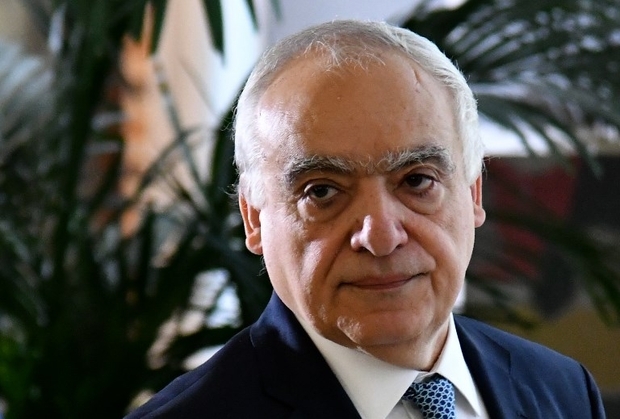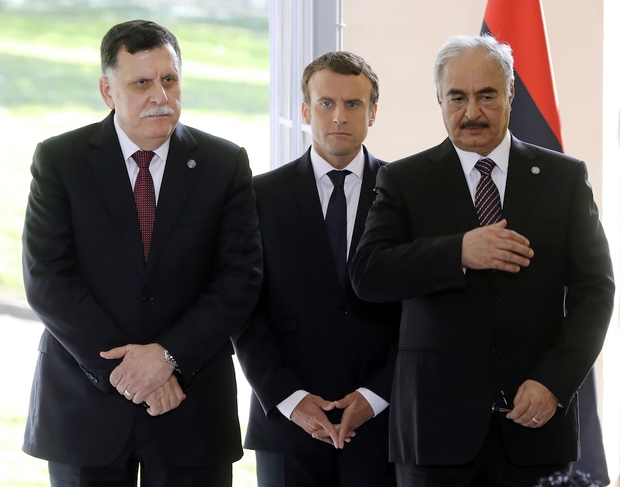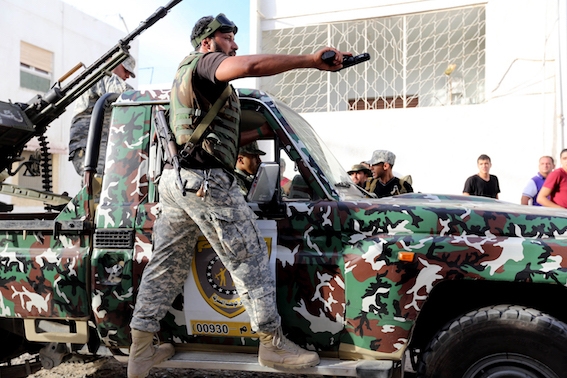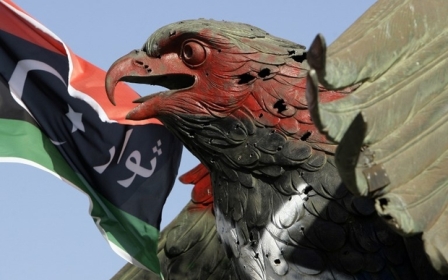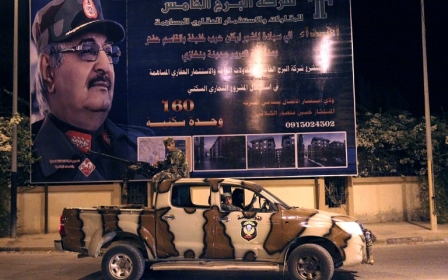Foreign minister for eastern Libyan government says unity deal 'by December'
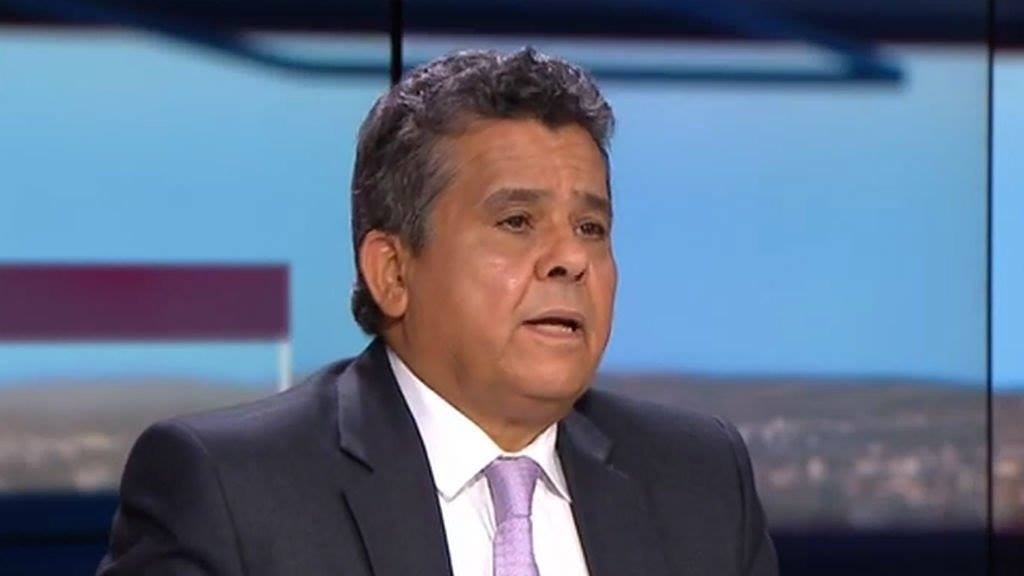
TUNIS – The foreign minister of a rival Libyan government to the United Nations-backed administration in Tripoli has told Middle East Eye that he believes a unity deal could be agreed before the end of the year.
Speaking to MEE in Tunis, the Tunisian capital, Mohamed Dayri, a member of the government based in the eastern city of Bayda that is linked to the Tobruk-based House of Representatives parliament and Field Marshal Khalifa Haftar’s Libyan National Army, also said that members of former Libyan leader Muammar Gaddafi’s family and circle should be free to stand in future elections.
Asked whether he would object if Saif al-Islam, Gaddafi’s son who was released from prison earlier this year, stood in elections, Dayri said: “I am not going to single anyone out. All former Gaddafi supporters, average citizens and politicians alike, are free to return to Libya to contribute to the new society we hope to build.
“Libya is in the midst of an unprecedented crisis and they should, as fellow compatriots, support us in our efforts towards national reconstruction.”
A full transcript of MEE’s interview with Dayri is below.
Middle East Eye: Since September, the UN Support Mission in Libya (UNSMIL) has been hosting delegations in Tunis to draw up amendments to the Skhirat political agreement, the December 2015 deal which sort to resolve the dispute between Libya’s rival administrations. What are your views on these discussions?
Mohammed Dairi: We are pursuing the efforts of Ghassan Salame, the UN special envoy to Libya. He has convened delegations from the rival parliaments, one from the House of Representatives and one from the High Council of State [upper house composed of members of the General National Congress, the parliament in Tripoli formed under the terms of the Skhirat Agreement].
We have not yet come to an agreement regarding the amendments. Discussions are currently under way in Tobruk and Tripoli. We are confident that a solution will be found by December.
The people are fed up with the crisis, which is affecting the country’s economy and security as well as its politics. They are impatient for a real government of national unity, and for the nine-member Presidential Council to be reduced to a body of three.
MD: I think Mr. Salame mentioned the date as a general indication but the first thing to be done is to form a presidential council and a government able to address urgent issues and to work with the UN, in order to pave the way for a constitutional referendum, and for presidential and parliamentary elections.
MEE: So you expect delays?
MD: Possibly. But it isn’t 17 December yet, and we are hopeful that a solution can be found by that time.
'Questions of legality aside, waiting is no longer an option for the Libyan people'
MEE: 17 December marks the second anniversary of the signing of the Skhirat Agreement, which has never been implemented. Do you believe, like some Libyans, that the agreement expires on this date?
MD: It’s an anniversary date. Questions of legality aside, waiting is no longer an option for the Libyan people. Libya’s political elite and the international community should not put forward a solution to be implemented after this date. Too much time has been lost since 2015. Libyans are fed up with all the friction. Libya’s political leaders and the international community are hard at work, as they have demonstrated recently at meetings in Rome, Paris and the Netherlands.
They have agreed on the terms of the road map put forward by UN Secretary-General Antonio Manuel de Oliveira Gutteres and his special envoy. There was a considerable show of support in New York. The presidents [Emmanuel] Macron [of France], [Abdel Fattah] al-Sisi [of Egypt] and other heads of state spoke during the special session on Libya.
MD: There is a French expression, “Nature abhors a vacuum”. For months, in Libya, we have suffered with the absence of a UN special envoy to Libya. Let me explain. A candidate was put forward in January and was turned down, followed by a second, rejected too.
A lot of time was lost – seven whole months – before the August appointment of Ghassan Salame. Yet it created a new momentum to organise meetings in Rome and the Netherlands. As for President Macron’s welcome initiative, it is a presidential initiative, that of a European head of state trying to speed up the Libyan peace process.
MEE: Did last May’s presidential elections lead to a reversal of French policy towards Libya? France had seemed rather on the fence since the 2011 Libyan Revolution…
MD: France under Francois Hollande was marked by moderation. However, the November 2015 Paris attacks revealed the magnitude of the terrorism problem in Iraq and Syria but also in Libya.
'Obama acknowledged the fact that errors were committed, that Libya was left to fend for itself'
Emmanuel Macron sees the crisis from a new perspective, supporting what he has rightly called issues of both military and political legitimacy. We are very happy with the more balanced approach of France, a stance that was conspicuously absent in the international community prior to the meeting in La Celle-Saint-Cloud.
Jean-Yves le Drian, Minister for Europe and Foreign Affairs, has no doubt played an important part. Under Francois Hollande, he was already setting the stage for a more dynamic Libyan policy.
MEE: What about the countries bordering Libya? At one point, Egypt, Tunisia and Algeria announced a regional initiative.
MD: No joint initiatives have been undertaken in the region. Talks were held, but the question of Libya was not addressed. No tripartite delegations have come to Libya, and Libya has not been invited to talks in Tunis, Cairo or Algiers, as it has been in the capital cities of Europe.
MEE: In your view, the situation in Libya is of concern to the international community. Some Libyans feel they were forgotten in the aftermath of the revolution, however.
MD: [US] President [Barack] Obama acknowledged the fact that errors were committed, that Libya was left to fend for itself. In my opinion, he wasn’t referring to the role played by America alone but to that of the Western forces, which intervened in 2011 without helping post-revolutionary Libya transition to stability.
Obama’s remark holds true for the United States, France, and the United Kingdom. These countries abandoned us, and so did the UN Security Council, which only intervened in August 2014, following the horrors committed by Fajr Libya [pro-Islamist militias which seized control of Tripoli in 2014, forcing the House of Representative to move to Tobruk]. Subsequently, there would also be other shortcomings as well.
MEE: Which shortcomings are you referring to?
MD: Emphasis is often placed on the political aspect of the crisis, but few efforts are being made to bring the security crisis to an end. The truth is, the country is in fact divided by a political crisis, but we cannot overlook the security crisis that has seen IS [the Islamic State group], al-Qaeda in Islamic Maghreb [AQIM] and other extremist groups multiply in Libya.
The focus is often on the repercussions [of terrorism] in the region and in Europe, but we forget that the main victims of Libyan terrorism are the Libyans themselves.
We are tired of the threat of escalating dangers. The crisis can also be seen in the heavily-armed militias, unchecked by the government, especially in the west. People are being kidnapped, ransoms are being demanded in Tripoli and in other western other cities.
MD: Egypt’s efforts are welcome. There was an initial meeting in July that allowed rival factions to lower their guard psychologically and to address the question of the reunification of the Libyan army.
I would like to stress the importance of the results of the second round of meetings in September between representatives of the Libyan National Army [under the command of Haftar] and their fellow compatriots from Misrata [who support the Government of National Unity in Tripoli].
They endorsed certain fundamental principles, including the necessity of reuniting the army and of supporting the democratic process, but without directly involving themselves in the process.
We are awaiting the results of the third round of meetings between other armed militias that were held in late October.
MEE: Another issue is of particular concern to Europe, the question of migrants. What can be done to stem the flow of people between Libya and Italy?
MD: We must see to the forming of a unified national government, while kick-starting solutions to the current security crisis.
Libya can only put an end to the horrors being perpetrated by the militias if the country is united and safe. Current efforts are bound to fail. Look at the reports of the EU Border Assistance Mission in Libya (EUBAM), in which the limits of the European initiatives in the area are openly acknowledged.
'Funding militias known for violent extremism is a very serious mistake'
MEE: Last summer, Italy was accused of paying off human traffickers in the city of Sabratha, 80 kilometres west of Tripoli, in order to stop the flow of migrants. What are your views on such a policy?
MD: Funding militias known for violent extremism is a very serious mistake. By doing so, Italy became an accomplice to those groups, who use the money to purchase weapons and influence. In other words, Italy has helped strengthen extremist groups in Libya.
We are opposed to this so-called policy of “understanding” which, to me, amounts to supporting the militias. Security in the country must be guaranteed by the police and the Libyan national army.
MEE: What about the supporters of the former regime? Many people see them as potential players in the future of Libya. Do you agree?
MD: A good number have returned to eastern Libya, which threw open its doors in 2015, following the Tobruk amnesty law and appeals by politicians, which our government supported by issuing reintegration decrees. These people will be able to participate in future elections.
MEE: So you would not object to the candidacies of Saif al-Islam Gaddafi, released from jail earlier this summer, or Bashir Saleh, who managed Muammar Gaddafi’s sovereign wealth fund?
MD: I am not going to single anyone out. All former Gaddafi supporters, average citizens and politicians alike, are free to return to Libya to contribute to the new society we hope to build. Libya is in the midst of an unprecedented crisis and they should, as fellow compatriots, support us in our efforts towards national reconstruction.
This piece originally appeared on the French version of Middle East Eye.
New MEE newsletter: Jerusalem Dispatch
Sign up to get the latest insights and analysis on Israel-Palestine, alongside Turkey Unpacked and other MEE newsletters
Middle East Eye delivers independent and unrivalled coverage and analysis of the Middle East, North Africa and beyond. To learn more about republishing this content and the associated fees, please fill out this form. More about MEE can be found here.


